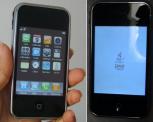 The iPhone is the cornerstone of Apples juggernaut, by some accounts bringing in as much as 50 percent of all of the companys revenues on a quarterly basis. Given that, when iPhone sales taper off a bit, the ripple effect throughout the companys financial numbers can be significant. That happened last year, when anticipation over the upcoming release of the Apple 4S caused some iPhone fans to hold back on their purchases, leading to Apple miss analysts profit expectations and the companys stock to take a hit. Apple officials could report another slowdown in iPhone sales when they announce the companys fiscal year third quarter on July 24. Analysts believe that sales during the quarter slowed a bit as buyers await the iPhone 5, expected to be released this fall, in time for the holiday shopping season. The phone is expected to offer a thinner profile, larger display and a quad-core processor, among other new featuresnone of which have been confirmed by Apple. That apparently has been enough to convince some buyers to hold onto their iPhone money until the next version comes out, probably sometime in October. Apple executives reportedly are expected to announce that the company sold about 29 million iPhones during the second three months of the year, compared with 20.34 it sold during the same period in 2011. In the first three months this year, Apple sold 35.1 million iPhones, an 88 percent jump from the first calendar quarter last year. Analysts questioned by Reuters said they expect Apple to report $37.35 billion in revenues, better than the $34 billion company executives forecast in during its last quarterly earnings call in April. Bloomberg reported that analysts polled said profit would come in at about $9.89 billion. However, while the slowdown in iPhone sales in the past quarter will have a negative impact on Apple, the release of the iPhone 5 should prove to be a boon for the company, according to analysts. People are waiting, Andy Hargreaves, an analyst at Pacific Crest Securities, told Bloomberg. Its going to be bad now, but great later. Since its introduction five years ago, the iPhone has been the engine that has helped Apple become the most valuable company in the world. In a report in June, analysts at market research firm Strategy Analytics reported that since the first iPhone launched in June 2009, it has generated $150 billion in sales for the company, with more than 250 million being sold worldwide. "The iPhone portfolio has become a huge generator of cash and profit for Apple, Neil Mawston, executive director at Strategy Analytics, said in a statement at the time. However, there are emerging signs that the iPhones next five years could get tougher. That is because of growing completion from a host of device makersparticularly Samsungwhose products run on Googles Android mobile operating system. In addition, some mobile operators are increasingly worried about the high level of subsidies they have to pay to sell the iPhone, Mawston said. Samsung in particular is seen as Apples top competitor. The company announced July 22 that after only two months on the market, its Galaxy S III smartphone has sold more than 10 million units. However, a survey by analysts from The 451 Group this month noted an unprecedented level of advance demand for the next-generation iPhone. Following the iPhone in popularity is the iPad, which combined with the smartphone account for as much as 75 percent of Apple revenues, according to analysts. Fortune reported earlier this month that the consensus from 61 analyst forecasts came to 18.75 million iPads sold in the quarter, a jump from the record 15.43 million it sold during the last three months of 2011. The second calendar quarter this year marked the first full quarter that the iPad 3 was on the market, and over the quarter sold in 25 countries, though it got a late start in the massive Chinese market. In addition, Apples release of an upgraded lineup of Macs in early June could impact the numbers from that business. | 








